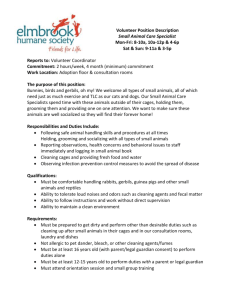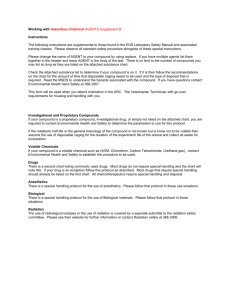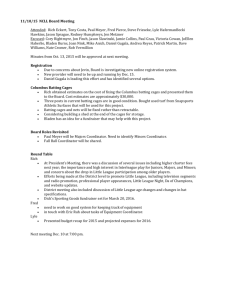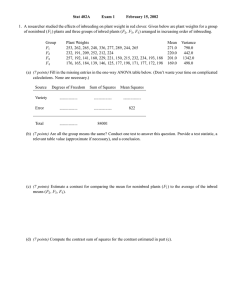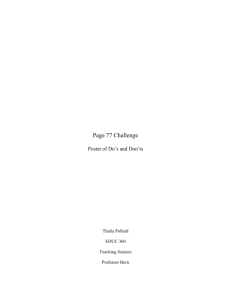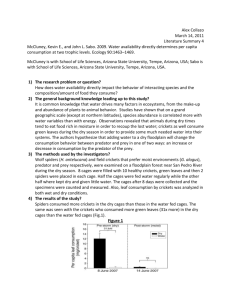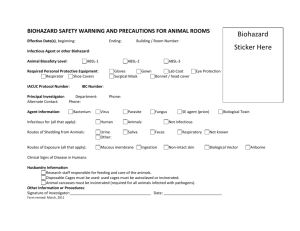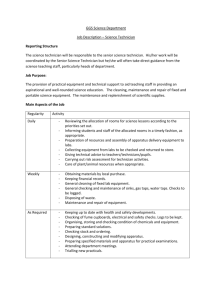Department of Human Resources OPSEU Job
advertisement
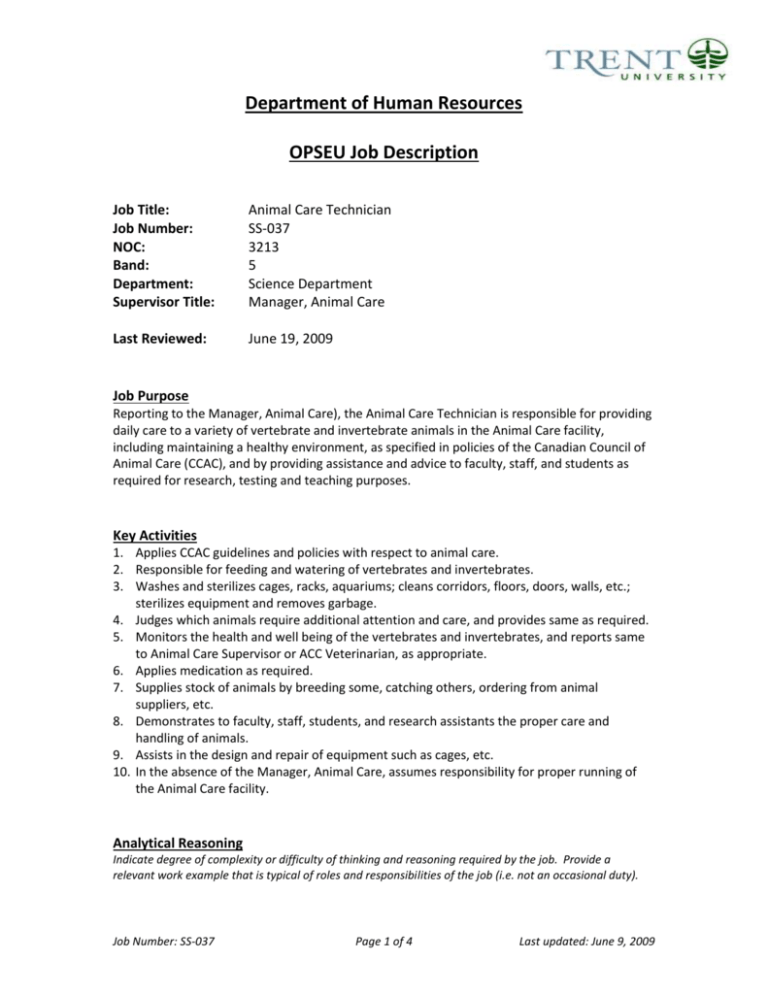
Department of Human Resources OPSEU Job Description Job Title: Job Number: NOC: Band: Department: Supervisor Title: Animal Care Technician SS-037 3213 5 Science Department Manager, Animal Care Last Reviewed: June 19, 2009 Job Purpose Reporting to the Manager, Animal Care), the Animal Care Technician is responsible for providing daily care to a variety of vertebrate and invertebrate animals in the Animal Care facility, including maintaining a healthy environment, as specified in policies of the Canadian Council of Animal Care (CCAC), and by providing assistance and advice to faculty, staff, and students as required for research, testing and teaching purposes. Key Activities 1. Applies CCAC guidelines and policies with respect to animal care. 2. Responsible for feeding and watering of vertebrates and invertebrates. 3. Washes and sterilizes cages, racks, aquariums; cleans corridors, floors, doors, walls, etc.; sterilizes equipment and removes garbage. 4. Judges which animals require additional attention and care, and provides same as required. 5. Monitors the health and well being of the vertebrates and invertebrates, and reports same to Animal Care Supervisor or ACC Veterinarian, as appropriate. 6. Applies medication as required. 7. Supplies stock of animals by breeding some, catching others, ordering from animal suppliers, etc. 8. Demonstrates to faculty, staff, students, and research assistants the proper care and handling of animals. 9. Assists in the design and repair of equipment such as cages, etc. 10. In the absence of the Manager, Animal Care, assumes responsibility for proper running of the Animal Care facility. Analytical Reasoning Indicate degree of complexity or difficulty of thinking and reasoning required by the job. Provide a relevant work example that is typical of roles and responsibilities of the job (i.e. not an occasional duty). Job Number: SS-037 Page 1 of 4 Last updated: June 9, 2009 Decision Making Indicate the degree of freedom to exercise initiative or act independently in making day- to-day decisions. Provide a relevant work example that is typical of roles and responsibilities of the job (i.e. not an occasional duty). Impact Indicate the impact or consequence to the department or University of typical actions or decisions taken by the job incumbent. Provide a relevant work example that is typical of roles and responsibilities of the job (i.e. not an occasional duty). Education College Diploma (3 year) in Laboratory Animal Science or Veterinary Technology or equivalent; CALAS registration as a Lab Animal or Veterinary Technician for Animal Care is preferred. Experience Required 1. Must have experience, and be comfortable working with and handling all species. 2. Demonstrated ability to work independently and to interact positively with fellow workers in a team situation. 3. Demonstrated effectiveness working with minimal supervision with proven reliability. 4. Animal Care facility requires seven-days-a-week attention; must be willing and able to work occasional evenings, weekends and holidays. 5. Ability to lift 50 pounds on a regular basis. 6. Demonstrated skills in, and commitment to, customer service and continuous improvement. Responsibility for the Work of Others Direct Responsibility N/A Indirect Responsibility Volunteers/Coop Students: Assists volunteers in performing duties relating to feeding, watering and cleaning cages as well as housekeeping duties as required. Helps volunteers to locate and properly use equipment and supplies for this purpose and offers advice and assistance in the direct handling of animals. Students: In the absence of the Animal Care Supervisor oversees student activity in the facility to ensure proper handling of animals as specified by CCAC guidelines with the aim of minimizing stress on the animal while satisfying the user's objectives. Animal Care Assistant: In the absence of the Animal Care Supervisor, the Animal Care Assistant may be scheduled to provide additional support to the Animal Care Technician in which case the Assistant would follow the Technician’s guidance in performing duties relating to feeding, watering and cleaning cages as well as with housekeeping duties as required. Job Number: SS-037 Page 2 of 4 Last updated: June 9, 2009 Communication Internal; Faculty, with respect to animal care matters Staff, exchange information regarding undergraduate teaching lab times and lab requirements as related to animals, pass this information on to Animal Care Supervisor or act on it in his/her absence. Exchange information from other support departments such as PRD when facility maintenance requires it. Students, exchange information on undergraduate teaching labs/projects involving animals, offer advice or assistance on matters relating to the care and handling of animals External: General public, exchange information or answer common questions about the care and handling of animals Motor/ Sensory Skills Fine Motor Skills, dexterity, coordination - Capture and handling of animals for cage cleaning, examination, culling etc., filling and changing water bottles, corks, loading/unloading dishwasher Gross Motor Skills, Coordination, Equilibrium - Loading, unloading, moving feed and bedding supplies, filling or emptying water buckets Smell, Sensory Distinction, Touch - Assessing condition of cages, need for cleaning, locating dead or sick animals Handling animals, often very small or newborn Visual, Sensory Distinct - Assessing health of animals, looking for signs of injury, illness Effort Mental: Sustained attention - Cleaning cages, handling animals, often many animals at once, constantly moving Seeing, touching - Counting animals for teaching or research, up to 100's of small invertebrates, accurately and gently handled Physical: Lifting, carrying, moving - Loading/unloading carts or skids with bags or bales of feed up to 50lbs or bedding, carry, fill or empty water buckets, aquariums etc. Working Conditions Physical: Job Number: SS-037 Page 3 of 4 Last updated: June 9, 2009 Exposure to feces, dust from bedding - Potential for causing respiratory disease, chronic sensitivities, asthma, allergies (note: PPE is provided to mitigate effects of these conditions) Exposure to animal dander - Dander may cause respiratory disease, chronic sensitivities, asthma, allergies, Noxious fumes, odours - Dirty cages emit ammonia fumes, certain animals emit foul odours Physical Discomfort - Necessity to wear various personal protective items (e.g. breathing mask, gloves) for long periods when changing cages, etc. Psychological: Conflicting work priorities - Daily chores must be done, frequent, unscheduled interruptions from faculty, staff and students requiring services Isolation, lack of windows - Facility requires controlled environmental conditions for animals, higher than normal security, locked doors, limited access Monotony - Cleaning cages done every working day, lack of control over volume of work to be done Job Description Approved by Human Resources (as per Article 17.1): Name (print): Signature: Date: Signatures - indicating that the job description has been read and understood: Incumbent Name (print): Signature: Date: Immediate Supervisor: Name (print): Signature: Date: Department Head/ Dean: Name (print): Signature: Date: Job Number: SS-037 Page 4 of 4 Last updated: June 9, 2009
